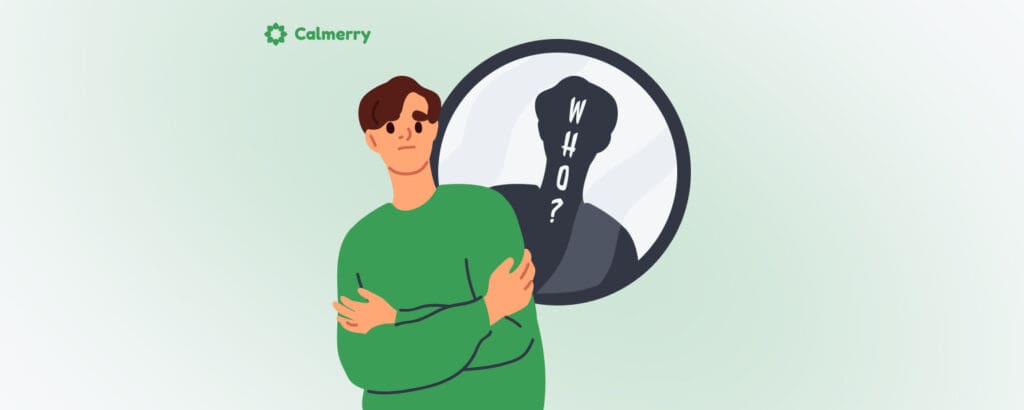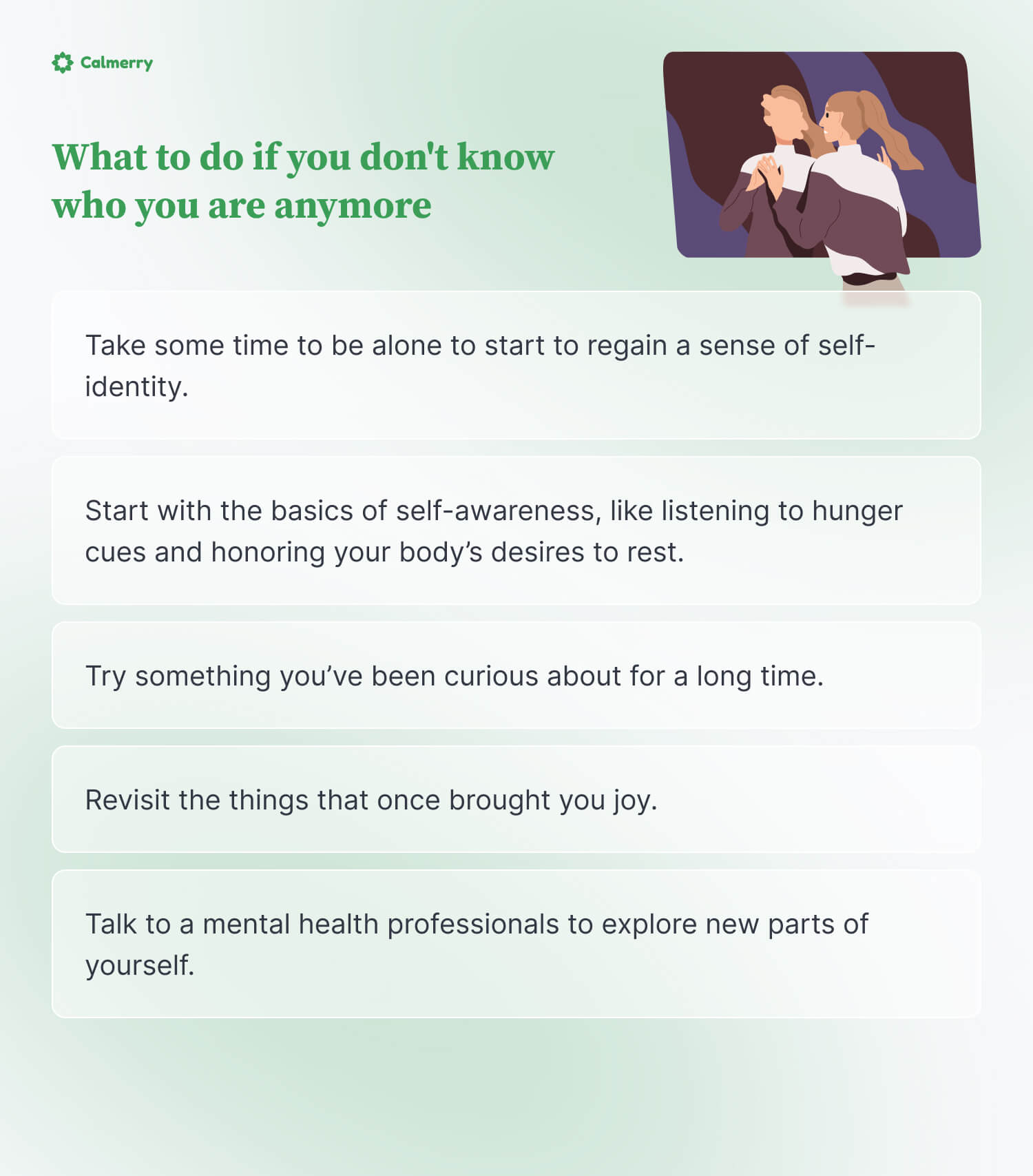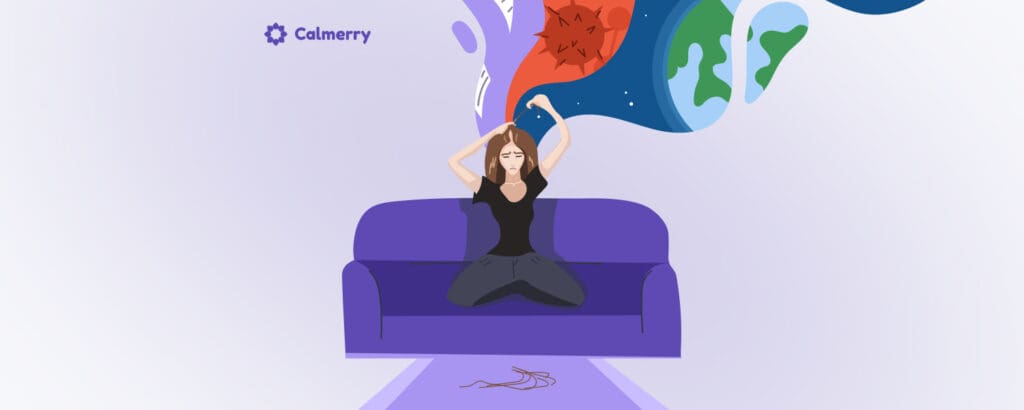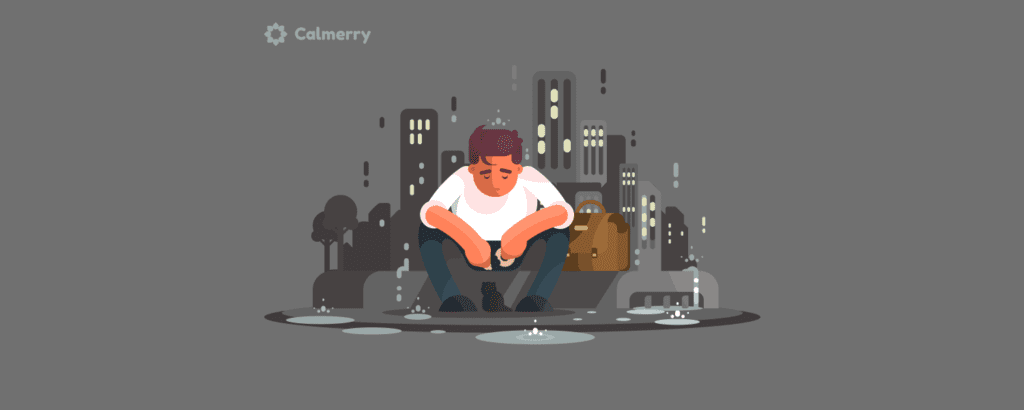“I Don’t Know Who I Am”: Why You’re Struggling with Who You Are and How to Rediscover Yourself

In this article
Who am I and what am I doing? That daunting thought has stuck with all of us.
We’re going about our lives, walking the dog, cooking dinner, writing a spreadsheet at work, or even sleeping peacefully through the night, when all of a sudden, we’re faced with those deep, existential questions.
Some of us toss those thoughts aside, while others will profoundly change our lives based upon those questions demanding to be answered.
The human experience is complex. Once our basic physical and safety needs are met, our brains are free to be creative and search through the essence of one’s soul to form an identity. We want to know who we are, how we’re meant to contribute to the world, and, ultimately, how we’re meant to be happy.
You want to be in sync with your true self, but what if you don’t know who that is?
You’re not alone. Some people are content to never do the necessary exploration to have a concrete sense of identity. But others are willing to embrace the big jump into the unknown, even if they don’t know it yet.
The process of finding one’s true self can be a deep journey. It will ask you to confront many previously-held beliefs, revisit old wounds, and make a few bets on yourself. It will also ask you why you’ve begun your soul-searching process in the first place.
– Alicia Ortega, Therapist-turned mental health writer
Let’s explore why you don’t know who you are and how you can rediscover yourself.
Why do I feel like I don’t know who I am?
There are many reasons why a person might feel like they don’t know who they are.
As children, most of us are told what to do and how to be to ensure good grades, jobs, friends, and relationships. Our self-exploration is usually quite shallow to make those connections.
If you like baseball, you might only be interested in following your hometown team if no one ever asked you to consider how another team’s play affects your team.
Sometimes, this shallow understanding of self is fine. But other times, it ensures that we never grow past beliefs that we developed as children, especially ones imparted upon us by the adults in our lives.
When we grow up, the demands of the adult world often keep self-exploration on the backburner. It can be difficult to find a moment to think about your life’s purpose and true identity when you’re working 60-hour weeks and shuttling your kids between school, home, and extracurriculars. Life gets hectic.
Even still, there are more specific reasons why you might feel like you don’t know who you are, including:
Childhood trauma
If you’ve experienced childhood trauma and you feel as if you don’t know who you are, it may be because you never had a concrete sense of self in the first place.
Childhood trauma fundamentally changes who we are and how we feel our potential outcomes could be. Our childhood experiences craft the lenses with which we see the world. They form our default modes of operation.
– Alicia Ortega, Therapist-turned mental health writer
Therefore, if your earliest life experiences told you that the world is unsafe and people cannot be trusted, you will have to do active work when you are older to dismantle these beliefs.
Childhood trauma shows up in a variety of ways, some more glaringly obvious than others. [1] Understanding child trauma. (n.d.). What Is Childhood Trauma? | SAMHSA. https://www.samhsa.gov/child-trauma/understanding-child-trauma
For example, if you experienced a serious car accident as a child, you might have physical trauma from the impact, but you might also develop a phobia around cars. You may take on the identity of a person who is fearful of cars, despite your small inner voice having a curiosity and interest around them. This tension between your lived experience and desired experience can create anxiety.
Complex trauma, a chronic, deeply interpersonal, and identity-shifting form of trauma, often happens in childhood. There are many interwoven aspects to complex trauma, many of which affect the ability to feel safe and secure. Remember, safety and security is necessary to explore our inner selves and nail down a sense of self.
A person with complex trauma may not interpret safety as a calm, restorative rest, but instead as a ticking time bomb for the next crisis. Complex trauma also eviscerates the formation of self-esteem, self-worth, and even, a sense of self and personal interests.
Major life changes
Major life changes can spark an identity crisis because of how significant they are. Most major life changes ask you to shift one of your roles into a completely new one, one that you may not feel ready to embrace. This can happen with planned and unplanned events alike.
Some major life changes are concrete events that push you from one stage of life into another, such as the birth of a child, marriage, or divorce. Others are more nebulous, such as adolescence or a midlife crisis.
These shifts can be dramatic, with intense ups and downs that happen quickly. Because of all the wild variations, you may be prone to losing a sense of self, which can look like acting irrationally, making impulsive choices, and feeling a persistent sense of anxiety or depression.
Stress
When you’re chronically stressed, your sense of self can go out the window. Stress in large amounts can plummet you into survival mode, where you’re just trying to get to the next moment.
This stress can be expected or unexpected and can originate from situations that you’ve been experiencing for a prolonged period of time without stress.
For example, you may have been at a certain job for a long period of time with no issue, but suddenly, the stress of a new account has you forgetting your first name and if you even like your career.

What to do if you don’t know who you are anymore
The good news is that if you’re feeling lost in life, you can reset your course at any time. You don’t need permission from anyone else to get started on your exploration.
Here are some tips to help rediscover yourself when you feel like you don’t know who you are anymore:
Take some time to be alone
Time alone, without input from family members, bosses, or even media, can help you start to regain a sense of self-identity.
It can be tremendously helpful to regularly get back into your own head and listen to your own voice be the only one that influences the decisions that you make, or the conclusions you decide are the best fit for you.
Improve your self-awareness
If you are absolutely lost, with no sense of self, it may help to actively work on improving your self-awareness.
At the most basic level, this starts with listening to hunger cues and honoring your body’s desires to rest. As you get better at recognizing those sensations, you will work to maintain alignment with them.
This builds a sense of trust in yourself, which will help you as you branch out into exploring other areas of the self. [2] London, M., Sessa, V. I., & Shelley, L. A. (2023). Developing Self-Awareness: Learning processes for self- and interpersonal growth. Annual Review of Organizational Psychology and Organizational Behavior, 10(1), 261–288. https://doi.org/10.1146/annurev-orgpsych-120920-044531
Try new things
An excellent way to rediscover yourself is to try something you’ve been curious about for a long time.
By trying something new, you learn that you’re a person willing to push beyond their comfort zone to get what they want and you may learn if that new experience is aligned with you or not.
Pick up old habits
Sometimes, the world demands that we abandon the interests we had as children to be taken more seriously. You might have dropped your love of gymnastics because you were never going to be an Olympian or stopped painting because your children demanded every moment of your time.
As you rediscover yourself, revisit the things that once brought you joy.
Try not to judge these interests or yourself too harshly for enjoying them again. You’re allowed to do so, and these old interests can give you answers about who you are for doing so.
– Alicia Ortega, Therapist-turned mental health writer
Talk to a mental health professional
Because rediscovering yourself and establishing a sense of self can be so complex, it may be wise to seek outside help.
Mental health professionals are equipped to hold a non-judgmental space for you to explore new parts of yourself and can ask you the right questions to help you get to conclusions you may not have conceived of on your own.
There are many options for therapy. A great fit is waiting for you.
A word from Calmerry
Online therapy makes it convenient to find mental health support on your terms while maintaining the effectiveness of in-person treatment.
Calmerry provides an easy and accessible way to connect with licensed therapists from the comfort of your own home. These therapists are equipped and ready to help you address your concerns and able to guide you through your self-exploration journey.
If you’re ready to take the first step, support is here and ready for you.
Understanding child trauma. (n.d.). What Is Childhood Trauma? | SAMHSA. https://www.samhsa.gov/child-trauma/understanding-child-trauma
London, M., Sessa, V. I., & Shelley, L. A. (2023). Developing Self-Awareness: Learning processes for self- and interpersonal growth. Annual Review of Organizational Psychology and Organizational Behavior, 10(1), 261–288. https://doi.org/10.1146/annurev-orgpsych-120920-044531
online therapy
live video session



